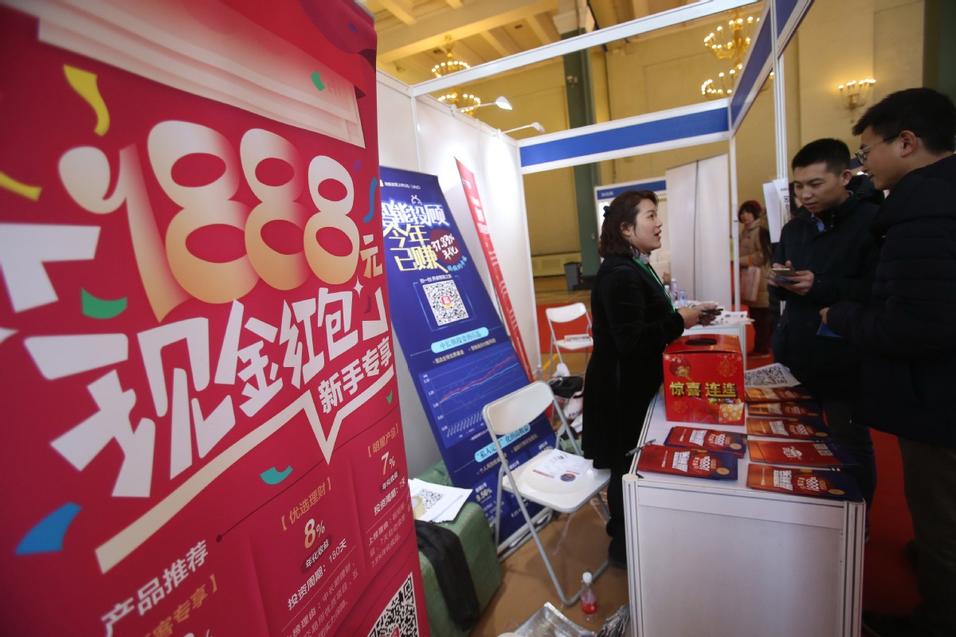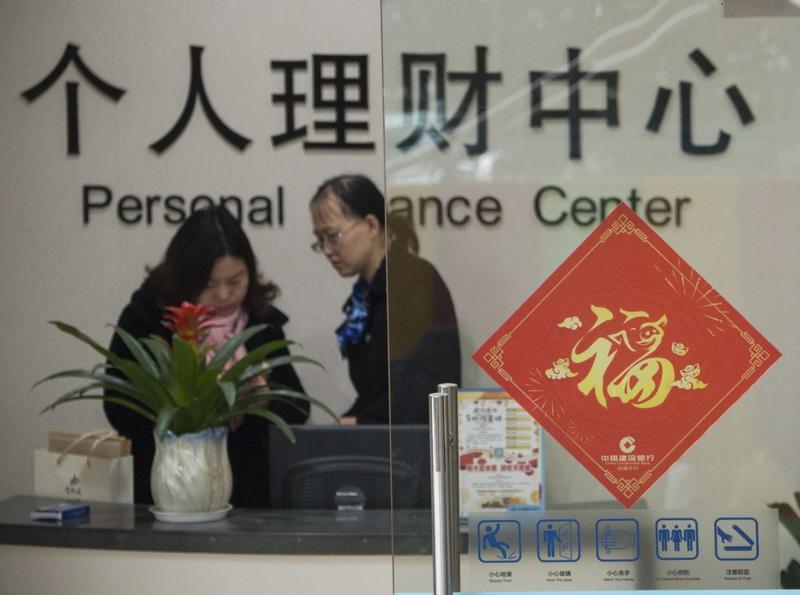 In this undated file photo, a staff member (left) introduces wealth management products (WMPs) to customers at an expo in Beijing. (PHOTO BY CHEN XIAOGEN / FOR CHINA DAILY)
In this undated file photo, a staff member (left) introduces wealth management products (WMPs) to customers at an expo in Beijing. (PHOTO BY CHEN XIAOGEN / FOR CHINA DAILY)
Wake up before 9 am, hurry through a quick breakfast, consume the latest news, and get glued to the PC screen by 9:30 am.
This is not the daily routine of a work-from-home young white-collar worker, but of my mom Hou Lijie. Mommy dearest, 56, is having a second career of sorts post-retirement. She has turned a full-time retail investor since retiring as a manager of an air-conditioning engineering unit last year after a 32-year career.
And she appears to be finding her groove in her new line of work. It is as though a mini supercomputer is lodged in one of the tracks of her mind, constantly crunching online data on funds, stocks, investment options, and asset classes.
She told me that each trading day, as China's A-share market gets going at 9:30 am, she tracks the stock market performance in real time on her PC through the day.
"I've spent most of my time on investing since I retired. I invest not just to avoid getting idle but, more importantly, to earn more to save more, in order to fund my post-retirement life, contribute to family needs, and offset the effects of inflation," Mom said.
Like my mother, millions of Chinese from all walks of life-office workers, deliverymen, millennial homemakers, retirees, and so forth-have jumped on the investing and wealth management bandwagon.
Amid the market volatility and increasing geopolitical tensions, 90 percent of Chinese investors told us in a recent survey that they need expert advice now more than ever.
Marina Lui, UBS' group managing director and head of China wealth management
This trend has spawned exciting growth opportunities for financial services companies that offer asset management and wealth management products, or WMPs, in China.
The trend turned a tidal wave recently on the back of a stellar A-share market performance in 2020, which pulled substantial household savings of investors with a risk appetite into stocks and other asset classes.
For instance, 426 newly established mutual funds succeeded in raising a staggering 1.07 trillion yuan (US$163.4 billion) in the first quarter of this year, double that seen in the same period last year, according to market tracker Wind Info.
The surge reflects some key structural changes in China that will power future demand for asset management and wealth management products, market insiders said.
Rising wealth of Chinese residents who are riding the economy's decades-long growth story, and growing awareness of retirement savings among an aging population are big factors, they said.
Marina Lui, UBS' group managing director and head of China wealth management, said the steady wealth creation in the country presents great business opportunities for UBS, one of the world's biggest wealth managers.
Lui said she is upbeat about the demand for wealth management products in China as the economy has seen per capita GDP surpassing US$10,000 since 2019 and boasts a large affluent population comprising, among others, business-owners.
The COVID-19-induced market volatility has further stoked Chinese investors' demand for professional financial services and advice. "Amid the market volatility and increasing geopolitical tensions, 90 percent of Chinese investors told us in a recent survey that they need expert advice now more than ever," Lui said.
Interactions between professional wealth managers and investors are, therefore, expected to spike in the years to come while Chinese household allocations for funds will increase, she said.
ALSO READ: WMP companies rely on online channels to expand their sales
A McKinsey & Company report said in December that assets under management of China's whole asset management market, which is already the world's second-largest, were worth 116 trillion yuan by the first half of 2020.
They are expected to grow by more than 9 percent per year on average from 2019 to 2025 and reach 196 trillion yuan by 2025.
So far, the wealth management industry's assets relative to the country's GDP are on a par in China, whereas in the United States, the United Kingdom and other advanced economies, they are more than 200 percent of local GDP.
At a forum in August, Zhu Shumin, then vice-chairman of the China Banking and Insurance Regulatory Commission, said the huge gap between China and other asset management markets suggests there is huge room for growth.
Policy supports, including more financial opening-up efforts, will help foreign institutions capitalize on the opportunities brought by the booming demand for asset management and wealth management products in China, experts said.
 In this undated file photo, a financial manager (right) talks to a client at a State-owned commercial bank in Hai'an, Jiangsu province. (PHOTO BY XU JINBO / FOR CHINA DAILY)
In this undated file photo, a financial manager (right) talks to a client at a State-owned commercial bank in Hai'an, Jiangsu province. (PHOTO BY XU JINBO / FOR CHINA DAILY)
China has made creating more competent wealth management products as one of the key tasks for boosting people's income in the coming five years.
The outline of the 14th Five-Year Plan (2021-25), the country's economic and social development blueprint for the period, has pledged to leverage multiple channels to boost residents' income generated from properties and innovate more financial products that suit households' demand for wealth management.
The outline also said the country will further the opening-up measures in the financial services industry, across segments like banking, securities, insurance, fund and futures, and deepen the connectivity of domestic and overseas capital markets.
Experts said foreign giants in the Chinese asset management and wealth management markets are going to prove a game-changer, and will propel domestic players to become competitive and improve the standards of investment products in China, especially when it comes to global allocation
For instance, the country has expanded the investment quota allowed by the Qualified Domestic Institutional Investors, or QDII, program, which allows Chinese investors to access foreign assets.
China is also preparing to roll out a wealth management connect in the Guangdong-Hong Kong-Macao Greater Bay Area to facilitate Guangdong-based residents to buy investment products offered by banks based in Hong Kong and Macao, and vice versa.
"Such opening-up measures would create opportunities to apply our global asset allocation experience to mainland investors and increase their investment returns," said Daniel Houston, chairman, president and CEO of Principal Financial Group.
The global pension and asset manager is ready to leverage its strength in long-term investment in China, Houston said. Green finance and the emerging onshore market of publicly offered real estate investment trusts, or REITs, are attractive options that Principal is looking at.
Principal is particularly impressed by the business potential of China's multi-pillar pension system as the silver-haired segment of the population expands, and will continue to deepen its partnership with China Construction Bank on their joint venture CCB Principal Asset Management, he said.
"We commend China's commitment to growing the offerings available to help more people achieve greater financial security. Principal is well-suited to apply its global knowledge and experience to the market in order to broaden the solution set available," said Houston.
Experts said foreign giants in the Chinese asset management and wealth management markets are going to prove a game-changer, and will propel domestic players to become competitive and improve the standards of investment products in China, especially when it comes to global allocation.
"The rising participation of foreign players is like introducing the more competitive 'catfish' into the already fierce competition in China's asset management sector. We domestic players can learn from their sound systems of investment philosophy, risk control and investment process," said Wang Haoyu, managing director of Beijing-based CreditEase Wealth Management.
 In this undated file photo, a man walks past a billboard advertising a bank's wealth management products in Tongling, Anhui province. (PHOTO BY AN XIN / FOR CHINA DAILY)
In this undated file photo, a man walks past a billboard advertising a bank's wealth management products in Tongling, Anhui province. (PHOTO BY AN XIN / FOR CHINA DAILY)
Wang said foreign asset managers with a presence in China may advise their overseas clients to invest here, bringing more foreign capital into the Chinese market.
Huang Dazhi, a researcher with the Suning Institute of Finance, said increasing foreign participation will help Chinese households diversify asset allocation and reduce investment risk, given foreign players' advantage in global allocation.
"Though being less competent than local players in terms of distribution channels and client resources, foreign players are good at global asset allocation and are more advanced in corporate operations and portfolio management," Huang said, adding that foreign institutions' long-term investment philosophy will help Chinese retail investors focus more on long-term returns.
According to Huang, foreign institutions are taking part in the Chinese wealth management sector mainly by setting up subsidiaries to provide financial products themselves, or by offering investment advisory services instead.
Europe's leading asset manager Amundi's majority-owned wealth management company has commenced business in China in September, while applications from BlackRock and Schroders to set up wealth management joint ventures, respectively, have received regulatory green light.
Since China removed the foreign ownership cap in the fund industry in April last year, overseas asset managers including BlackRock, Fidelity International, Neuberger Berman, AllianceBernstein, VanEck and Schroders have applied to set up a wholly owned mutual fund manager each in China. BlackRock received the approval in August.
READ MORE: Lenders' wealth management products stay the reform course
But, last month, US money manager Vanguard announced it has dropped the plan to obtain a mutual fund license in China. It said it will instead tap into the Chinese mutual funds market through its investment advisory joint venture with Ant Group.


